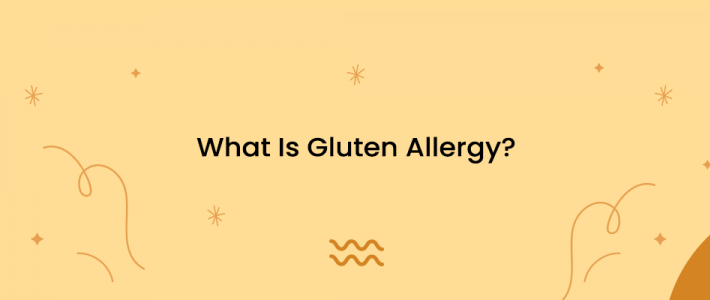
What Is a Gluten Allergy?
Gluten allergy, also known as wheat allergy; It is an allergic reaction when gluten or wheat is consumed, which affects the immune system, such as an autoimmune disease. Allergic reactions are reactions, usually triggered by certain foods or other foreign substances, to which the body then reacts abnormally.
A wheat allergy is an allergic reaction to foods containing wheat and can include reactions such as asthma, rash, and even anaphylaxis. Gluten allergy or wheat allergy; It does not trigger the immune response to attack the villi in the intestines, as the celiac disease autoimmune reaction does. Consuming or inhaling wheat or wheat ingredients can trigger an allergic reaction to wheat.
Although the symptoms of gluten allergy are usually mild, in some cases they can be severe or fatal. This necessitates the diagnosis and appropriate management of allergy.
Gluten allergy is most common in children; about two-thirds exceed this with a regular gluten-free diet. Many patients with a wheat allergy can eat other grains, but this is not true for everyone.
Gluten allergy symptoms;
- Hives, eczema or skin rash
- Nausea, stomach cramps, indigestion, vomiting or diarrhea
- Stuffy or runny nose
- Sneeze
- Headache
- Asthma
- Like anaphylaxis, which can impair breathing or shock the body; a potentially life-threatening reaction
It is seen in the form.
Some symptoms of gluten allergy are; stomach cramps, diarrhea, and other gastrointestinal symptoms. It overlaps with the symptoms seen in people with gluten sensitivity or celiac disease, an autoimmune disorder. Therefore, it is very important to get an accurate diagnosis. An allergist can determine if a gluten allergy is present.
People with gluten allergy should definitely eat gluten-free foods. Gluten-free foods; reduces the incidence of symptoms for people with allergies. Consumption of wheat and wheat-containing foods; cause severe allergic reactions. gluten allergy; Although it does not cause serious consequences as celiac disease, it requires proper nutrition. Wheat-free gluten-free breads produced for celiac patients can also be consumed by people with gluten allergies.
85 Comment(s)
1
1
1
1
1
1
1
1
1
1
1
1
1
1
1
1
1
1
1
1
1
1
1
1
1
1
1
1
1
1
1
1
1
1
1
1
1
1
1
1
1
1
1
1
1
1
1
1
1
1
1
1
1
1
1
1
1
1
1
1
1
1
1
1
1
1
1
1
1
1
1
1
1
1
1
1
1
1
1
1
1
1
1
1
1
1
1
1
1
1
1
1
1
1
1
1
1
1
1
1
1
1
1
1
1
1
1
1
1
1
1
1
1
1
1
1
1
1
1
1
1
1
1
1
1
1
1
1
1
1
1
1
1
1
1
1
1
1
1
1
1
1
1
1
1
1
1
1
1
1
1
1
1
1
1
1
1
1
1
1
1
1
1
1
1
1
1
1
1
1
1
1
1
1
1
1
1
1
1
1
1
1
1
1
1
1
1
1
1
1
1
1
1
1
1
1
1
1
1
1
1
1
1
1
1
1
1
1
1
1
1
1
1
1
1
1
1
1
1
1
1
1
1
1
1
1
1
1
1
1
1
1
1
1
1
1
1
1
1
1
1
1
1
1
1
1
1
1
1
1
1
1
1
1
1
1
1
1
1
1
1
1
1
1
1
1
1
1
1
1
1
1
1
1
1
1
1
1
1
1
1
1
1
1
1
1
1
1
1
1
1
1
1
1
1
1
1
1
1
1
1
1
1
1
1
1
1
1
1
1
1
1
1
1
1
1
1
1
1
1
1
1
1
1
1
1
1
1
1
1
1
1
1
1
1
1
1
1
1
1
1
1
1
1
1
1
1
1
1
1
1
1
1
1
1
1
1
1
1
1
1
1
1
1
1
1
1
1
1
1
1
1
1
1
1
1
1
1
1
1
1
1
1
1
1
1
1
1
1
1
1
1
1
1
1
1
1
1
1
1
1
1
1
1
1
1
1
1
1
1
1
1
1
1
1
1
1
1
1
1
1
1
1
1
1
1
1
1
1
1
1
1
1
1
1
1
1
1
1
1
1
1
1
1
1
1
1
1
1
1
1
1
1
1
1
1
1
1
1
1
1
1
1
1
1
1
1
1
1
1
1
1
1
1
1
1
1
1
1
1
1
1
1
1
1
1
1
1
1
1
1
1
1
1
1
1
1
1
1
1
1
1
1
1
1
1
1
1
1
1
1
1
1
1
1
1
1
1
1
1
1
1
1
1
1
1
1
1
1
1
1
1
1
1
1
1
1
1
1
1
1
1
1
1
1
1
1
1
1
1
1
1
1
1
1
1
1
1
1
1
1
1
1
1
1
1
1
1
1
1
1
1
1
1
1
1
1
1
1
1
1
1
1
1
1
1
1
1
1
1
1
1
Leave a Comment